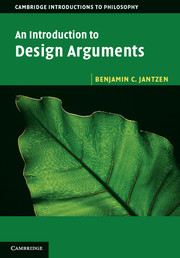Book contents
- Frontmatter
- Dedication
- Contents
- List of figures and tables
- Preface
- 1 Introduction
- 2 Preliminaries
- 3 Arguments from antiquity
- 4 Medieval arguments
- 5 The golden age of natural theology
- 6 Unusual design arguments
- 7 Hume
- 8 Paley
- 9 Darwin
- 10 Loose ends
- 11 The modern likelihood argument
- 12 Intelligent design I: irreducible complexity
- 13 Intelligent design II: specified complexity
- 14 What is complexity?
- 15 Supernatural agents and the role of laws
- 16 A brief survey of physical law
- 17 Fine tuning I: positive arguments
- 18 Fine tuning II: objections
- 19 Conclusion
- Bibliography
- Index
18 - Fine tuning II: objections
Published online by Cambridge University Press: 05 June 2014
- Frontmatter
- Dedication
- Contents
- List of figures and tables
- Preface
- 1 Introduction
- 2 Preliminaries
- 3 Arguments from antiquity
- 4 Medieval arguments
- 5 The golden age of natural theology
- 6 Unusual design arguments
- 7 Hume
- 8 Paley
- 9 Darwin
- 10 Loose ends
- 11 The modern likelihood argument
- 12 Intelligent design I: irreducible complexity
- 13 Intelligent design II: specified complexity
- 14 What is complexity?
- 15 Supernatural agents and the role of laws
- 16 A brief survey of physical law
- 17 Fine tuning I: positive arguments
- 18 Fine tuning II: objections
- 19 Conclusion
- Bibliography
- Index
Summary
Introduction
Design arguments from fine tuning come in a wide variety of flavors, but they all share some common ingredients. For starters, they all rest on the observation that the dimensionless parameters characterizing the laws of physics are ‘fine-tuned’ for life. Were we to dial in ever-so-slightly different values, so the story goes, we would find ourselves with a vastly different universe inhospitable to the likes of us. This fact of fine tuning cries out “conspiracy!” That’s a fine intuition, but an argument needs to make a rational case for such a claim. The typical fine-tuning argument makes this case in terms of probability or a related measure of how unlikely such a configuration would be given that the parameter values are the product of unintelligent chance. The result is overwhelming confidence in the design hypothesis.
Every element of the typical fine-tuning argument has been called into question. Some take issue with the claims of fine tuning themselves, arguing that the laws are not so finely adjusted and thus there is nothing to explain. More mathematically minded objectors have challenged the use of probabilities in those forms of fine-tuning argument that appeal to likelihoods or specified complexity. Finally, there are philosophical objections that take issue with the metaphysics implicit in describing a problem of fine tuning in the first place. In order to see a puzzle, in order to recognize a potential conspiracy, the advocate of fine tuning requires us to adopt a package of metaphysical positions on the nature of physical laws and our knowledge of them. Under a family of Humean views of science, there is no fine-tuning problem. We’ll take up each of these sorts of objections below. In the next chapter, we’ll take a step back and see where our ride through two millennia of design arguments has landed us. The answer suggests that attempting to untangle our intuitions of design may yet have something vital to teach us about the universe, irrespective of the ultimate verdict on design arguments.
- Type
- Chapter
- Information
- An Introduction to Design Arguments , pp. 291 - 310Publisher: Cambridge University PressPrint publication year: 2014



